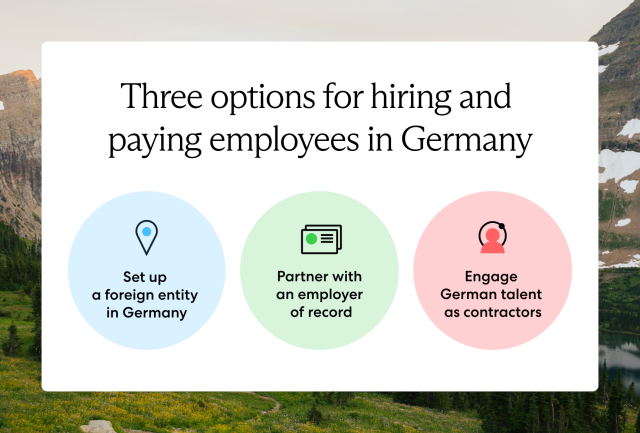Germany is a great place to grow your business and workforce. It’s a top economic power in Europe and one of the easiest countries to do business. Germany is also one of the most innovative countries on the globe and a promising market for tech firms considering global expansion.
Employers who want to employ someone in Germany from another country must understand their options, Germany’s unique employment laws, and the compliance risks to avoid.
This guide highlights employers’ options for hiring employees in Germany, what to know before engaging talent in Germany, and how to mitigate hiring compliance risks.
How to employ someone in Germany: 3 options
There are three main methods to employ someone in Germany from another country. While each has pros and cons, the route you choose depends on your short and long-term goals, time, and budget.

1. Establish a German entity
Establishing an entity in Germany gives you full autonomy to hire talent directly and handle employment logistics internally. Setting up an entity in Germany allows you to create a local presence in the country and hire employees yourself.
However, this traditional route for global expansion is costly, time-consuming, and not always a realistic solution—especially for firms looking for quicker, more flexible alternatives to employ someone in Germany.
2. Use an employer of record in Germany
A faster, more flexible alternative to entity establishment is to use an employer of record (EOR). An EOR serves as your legal entity and hires and pays your German workforce. An EOR understands and complies with Germany’s unique employment laws and handles onboarding, payroll, benefits, and risk mitigation while you maintain day-to-day employee management.
Partnering with an EOR to employ someone in Germany enables you to set up your remote workforce quickly and test the market before diving into long-term expansion in the country.
Learn more: What Is an Employer of Record (EOR)?
3. Hire and pay contractors in Germany
Employers can also engage contractors in Germany rather than hire employees. A contractor is a self-employed individual that you can use for short-term projects or sporadic needs. Engaging contractors is often a fast and flexible solution that doesn’t require entity establishment.
Still, while hiring a contingent workforce in Germany may seem less risky and more cost-effective than hiring full-time employees, it comes with severe worker misclassification risks, which can lead companies to face back pay, back taxes, and other legal penalties.
What is the cost of hiring an employee in Germany?
The cost of hiring an employee in Germany is, at a minimum, 19.6% of the employee’s base salary. This is because employers must contribute 9.3% of their employee’s base salary for pension insurance, 7.3% for health insurance, 1.3% for unemployment insurance, and 1.7% for nursing care insurance in 2024.
Employers must also contribute a percentage of their employee’s base salary to accident insurance, which depends on the industrial sector and accident risk.
Interested in hiring employees in Germany? Use our employee cost calculator to get reliable insights into employee costs and payroll contributions in Germany.
What to know before employing someone in Germany
Employers interested in hiring employees in Germany must understand and comply with Germany’s employment laws, including regulations governing employment contracts, types of leave, working hours, overtime, termination, paid holidays, and more.
Germany employment laws and practices
Here are several employment policies that apply to companies hiring employees in Germany:
- Employment contracts. Fixed-term and indefinite-term contracts are possible in Germany, but fixed-term contracts must not be longer than two years.
- Minimum wage. As of 2024, Germany's minimum wage is €12.41 per hour.
- Working hours. Standard working hours in Germany are eight hours a day with a 30-minute break—although one-hour breaks are common.
- Overtime. Overtime pay is outlined in the employment contract and not regulated by law.
- Probationary period. The standard probation period in Germany is six months for most permanent employees and up to 12 months for senior, executive, and management positions—but is not required by statute.
- Termination. Notice periods range depending on the cause of termination, length of service, or stipulations in the employment contract or collective bargaining agreement.
- Severance. There is no statutory severance in Germany. Employees are only entitled to severance under an agreement with the German works council.
- Annual leave. Employees are entitled to at least 20 days of paid leave per calendar year.
- Maternity leave. Employees receive maternity leave benefits for six weeks before the birth and eight weeks after. The allowance depends on the salary earned during the last cleared calendar months before the maternity period.
- Parental leave. Parents in Germany have the right to 12 months of unpaid parental leave and the flexibility to divide the leave between or be taken by one parent.
- Sick leave. After four weeks of employment, the employer must pay the employee their standard wage for up to six weeks in the event of sickness.
- Holidays. The country observes nine national public holidays throughout the year, while states throughout Germany celebrate additional holidays unique to their region.
13th-month pay in Germany
While offering 13th-month pay in Germany is not mandatory, many companies provide an extra month’s pay to employees as a benefit to improve talent attraction and retention. This additional payment is typically paid out in November.
Read also: Guide to Employee Benefits in Germany
Germany payroll regulations
Germany's regulations on payroll and payroll tax dictate the structure for pay frequency and contribution amounts.
Pay frequency
Germany generally operates on a monthly payroll cycle.
Employee and employer contributions
Employers and employees each contribute to social security:
- Employers and employees each contribute 9.3% to pension insurance
- Employers and employees each contribute 1.3% to unemployment insurance
- Employers and employees each contribute 7.3% to health insurance
- Employers contribute 1.7% and employees contribute 2.3% to long-term care insurance
Work accident schemes depend on the industry and the accident risk; the employer bears these contributions.
Compliance risks when employing someone in Germany
When navigating how to hire employees in Germany, employers must understand the country's policies on misclassification, payroll, having a permanent establishment, and immigration if they want to maintain hiring compliance.
Misclassification risk
If an employee is misclassified as a contractor, they could claim entitlement to employee benefits, and your company could face fines, legal penalties, and employee entitlement back pay obligations.
German authorities also actively seek out misclassified employees more regularly and aggressively than other countries. Consider legal counsel to help you avoid misclassification through compliant contracts and accurate reporting and payroll.
Read our complete guide to employee and contractor misclassification.
Incorrect payroll contributions
Germany’s payroll contributions vary from other countries, and you could face fines if you miscalculate them.
In Germany, most social security contributions are shared equally between the employer and the employee, except for long-term care insurance. Total contributions are 18.6% for pension, 14.6% for health insurance, 2.6% for unemployment, and 4% for long-term care insurance.
Permanent establishment
A company triggers permanent establishment and is liable to corporate taxes if it has a fixed physical or virtual location in Germany and generates revenue. If the company knowingly or inadvertently fails to comply, it could face repercussions like paying back unpaid taxes, interest, and other fees.
Immigration requirements
You may encounter a scenario where you need to hire employees in Germany, but they are not residents or citizens of the country. You may also face a situation where you must relocate an employee to Germany. If so, it’s essential to know the German immigration criteria to ensure your employees are legally employed and living in the country.
Germany’s Employment Visa allows qualified foreign residents to live and work in Germany for up to two years with the possibility of extending their visa. Still, the country has additional regulations on visas and visa requirements based on the individual’s citizenship, occupation type, and other factors.
Hiring employees in Germany is simple with Velocity Global
Germany’s market is full of opportunities—the hassles of entity establishment and complying with international employment laws shouldn’t deter you from growing your workforce across borders.
Instead, work with an EOR partner like Velocity Global, who gives you legal peace of mind, an expert services team, and a single platform to simplify global workforce management and navigate local employment laws with ease.
Velocity Global's EOR solution handles onboarding, payroll, benefits administration, immigration, and compliance so you can quickly and cost-effectively hire top-tier talent in Germany without setting up an entity or navigating complex labor and tax laws.
Contact us to learn how we can support you and your growing workforce in Germany and more than 185 countries.



